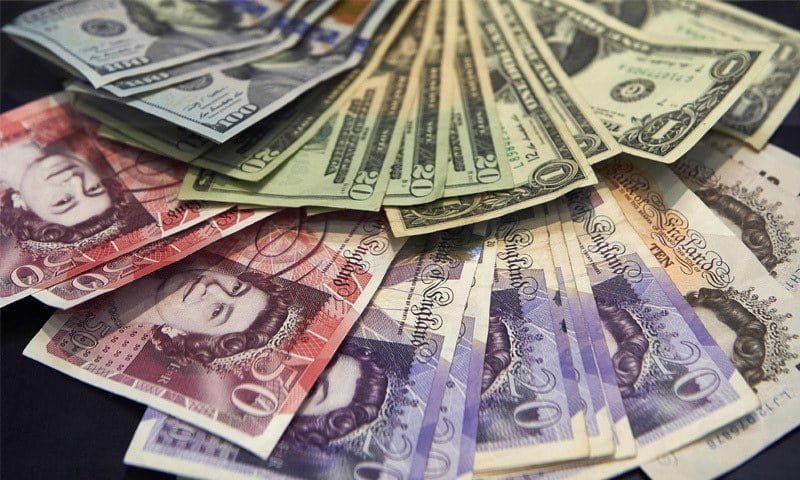EDITORIAL:
The news of a slight increase in remittances sent home by Pakistani migrants during February is a welcome development amidst the country’s full-blown economic crisis. The country is struggling with decades-high inflation, dwindling reserves, and industrial closures, and any positive news is much needed. Remittances serve as a lifeline for Pakistan, especially now when foreign financing is drying up and the country risks default due to the delay in the IMF deal.
According to the State Bank’s February data, remittances have surged by 5% after hitting a 32-month low in January. The market is optimistic about further spikes in remittances around Ramazan and Eid. However, remittances in the first eight months of this fiscal year dropped by nearly 11% to $17.99bn year-over-year. The market players attribute this situation to the large black market for foreign currency, which is a consequence of the unannounced cap on the exchange rate and import restrictions imposed by the government and the central bank to decelerate dollar outflows.
The cap is believed to have made it more profitable for migrant workers to send money through illegal channels due to the massive difference between the official and black market dollar rates. This move has not only affected the economy but also encourages illegal activities. Removing controls on the exchange rate last month under IMF pressure is helping boost remittances through legal channels. However, there is still a long way to go in terms of stabilizing the country’s economy.
Pakistan has a long-standing issue with the informal economy, and the government’s attempts to bring it into the formal economy have not been successful. The reliance on remittances is one of the reasons that the government has not made many efforts to increase foreign investment. The country is still recovering from the economic impact of the Covid-19 pandemic, and the situation is further compounded by the rising poverty levels, unemployment, and the burden of external debt.
Despite these challenges, the country’s economic indicators have improved in recent years, with GDP growth expected to reach 4% in 2021. The government has also introduced several reforms to address the issue of corruption and inefficiencies, including the digitization of the economy, streamlining of tax collection, and improving the ease of doing business.
However, these reforms will take time to have a significant impact on the country’s economy. In the meantime, the government must continue to focus on boosting remittances through legal channels, and creating an environment that encourages foreign investment. The removal of import restrictions and the cap on the exchange rate is a step in the right direction, but more needs to be done.
The recent uptick in remittances sent by Pakistani migrants is certainly a ray of hope amidst the country’s ongoing economic crisis. However, with high inflation rates and limited reserves, the nation is in dire need of sustained growth in remittances. The State Bank of Pakistan’s February data shows that remittances have increased by 5% after hitting a 32-month low in January. This is good news, but it’s not enough. Experts predict that a further increase can be expected during Ramazan and Eid.
Despite the recent increase, remittances in the first eight months of this fiscal year have dropped by nearly 11% to $17.99bn year-over-year. The decline is largely attributed to the large black market for foreign currency, which has emerged as a result of an unannounced cap on the exchange rate, coupled with import restrictions imposed by the government and central bank to slow down the outflow of dollars. The cap made it more profitable for migrant workers to send money through illegal channels, given the vast difference between the official and black market exchange rates.
The removal of exchange rate controls last month, under pressure from the IMF, is helping boost remittances through legal channels. However, the exchange rate cap isn’t the only reason for the decrease in remittances. Record inflation in most developed countries, including the US, UK, and EU countries, has forced Pakistanis living there to spend more on their daily needs, leaving them with less cash to send back home. SBP data shows that inflows from almost all significant destinations, with the exception of the US, have dropped during the current fiscal year. Inflows from Saudi Arabia and the UAE have plunged by over 15%, and by nearly 6% and 8.6% from the UK and EU, respectively.
The government must ensure that this ‘seasonal’ growth in remittances is preserved and built upon in the future. To achieve this, policymakers must stop meddling with the market-driven exchange rate mechanism and clamp down on importers who under-invoice their foreign purchases to save taxes. Such traders, including owners of large retail chains, are major buyers of dollars from the black market. Unless the under-declaration of import values is curbed, many poor migrant workers will continue to use illegal channels to send money to their families for a higher rate.
It’s important to note that remittances play a vital role in Pakistan’s economy, constituting approximately 8% of the country’s GDP. They are also an essential source of income for many Pakistani families. The government must take decisive steps to promote legal channels for remittances and offer incentives to encourage migrant workers to use these channels. For example, a reduction in remittance fees, coupled with streamlined procedures, would encourage more people to send money through legal channels.
Another solution could be to collaborate with other countries and international organizations to implement policies that support remittances. The United Nations’ Sustainable Development Goals emphasize the need to reduce the cost of remittances and increase their flow to developing countries. Pakistan can benefit from such international efforts by leveraging its diplomatic relations and advocating for policies that facilitate remittances.
It’s also worth mentioning that the government can take measures to reduce inflation rates in the country. This would help mitigate the impact of rising living costs on Pakistani migrants abroad, leaving them with more disposable income to send back home. However, reducing inflation is a complex process that requires comprehensive economic policies.
In conclusion, the recent increase in remittances is a positive development for Pakistan’s economy, but it’s not enough. The government must take steps to sustain this growth and encourage migrant workers to use legal channels to send money home. This will require a collaborative effort between policymakers, international organizations, and other countries.
Read more:
















